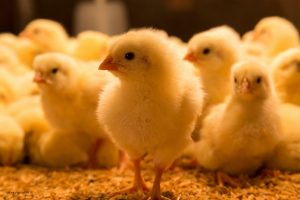Are you tending a backyard flock of chicks or ducklings this spring? If so, consider these tips from the Centers for Disease Control and Prevention (CDC) on reducing your risk of Salmonella poisoning.
 Salmonella from live poultry sickened more than 450 people in 2012. Generally, children are disproportionately affected in these outbreaks. Why? Their immunes systems are not fully developed, they are less likely than adults to wash their hands properly and more likely than adults to put their fingers in their mouths and to snuggle or kiss the small birds.
Salmonella from live poultry sickened more than 450 people in 2012. Generally, children are disproportionately affected in these outbreaks. Why? Their immunes systems are not fully developed, they are less likely than adults to wash their hands properly and more likely than adults to put their fingers in their mouths and to snuggle or kiss the small birds.
The CDC recommends that children under 5 and others with weakened immune systems, including pregnant women, not handle young birds. Older children should be supervised with the birds and while washing their hands afterward.
Wash hands thoroughly with soap and water right after touching live poultry or anything in the area where they are kept. Keeps all live birds and the equipment used to care for and feed them outside of the house. When cleaning equipment or materials used to tend the flock, use a dedicated set of cleaning materials.
Symptoms of a Salmonella infection include diarrhea, fever and abdominal cramps. Symptoms usually develop within one to three days of exposure and last up to a week.





It’s been my experience that most people that feed backyard wild birds, or raise backyard poultry,
are not concerned about the health threats salmonella bacteria can pose, whether it’s to the birds,
or humans. It’s already been proven through scientific study that dropping covered bird feeders
can potentially harbor harmful salmonella bacteria through droppings deposited on the feeder
from a bird infected with salmonellosis. But, I’m not aware of any reasonably long-term studies of
x# of backyards that poultry is being raised in to determine how bacteria laced these environments may,
or may not be. On the wild bird side, education efforts are poor, and all feeders on the market
harbor droppings on various surfaces which are unfortunately also surfaces where birds
will perch, directly exposing them to the droppings, and the salmonella bacteria the droppings can
potentially contain. Puzzling to me is how all of this collective apathy about the threats of salmonella
bacteria in backyards, flies in the face of Americans being more germ-conscience these days. On that
front though, Americans are pretty reasonable once they see the science on the matter.